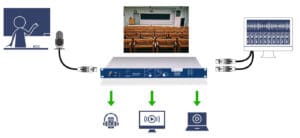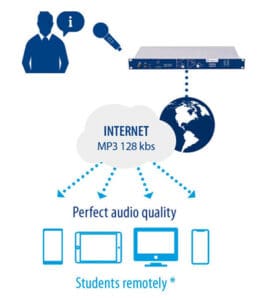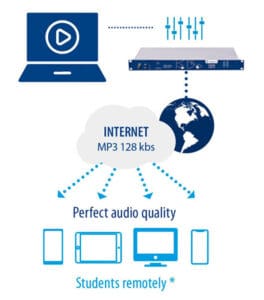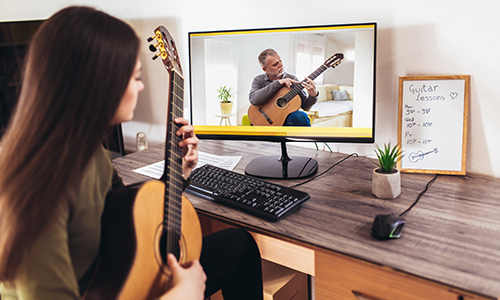Thomas Kikta, chair of Commercial Music, Media and Jazz at Duquesne University in Pittsburgh, got word that his campus was shutting down due to Covid-19 on March 12, 2020.
Remote learning was to begin 4 days later on March 16, leaving Kikta with only a few days to find the students and facility at the university’s Mary Pappert School of Music a solution that would improve upon the unreliable and poor audio quality during meetings via Zoom.
After consultation with the Synthax experts, he picked Digigram’s flagship CODEC IQOYA SERV/ LINK. Originally developed for uninterrupted, high-quality live remote broadcasting via IP networks, the SERV/LINK was simply perfect for next level online eduction.
The flexible 19 inch device provided the music school with pristine realtime audio to continue to conduct ambitious remote lessons, classes and auditions. The ultra-reliable device not only holds a record for bidirectional multi-channel audio connections, but supports all important audio formats, including Dante, MADI and Analog.
When it was announced that we were closing the campus, the first complaint I got from faculty was, “There’s no way I can do private lessons on Zoom.” They said, “I can’t tell vibrato, it warbles, it goes in and out. I can’t tell the tonal quality of the student. I can’t demonstrate for them.” There was a litany of complaints. —Thomas Kitka
 While most of the university’s distance learning classes require intelligible audio, for music classes reliable, high-quality audio is key. Thanks to Digigram´s easy-to-use CODEC technology, music school students now log into Zoom to see the video and simply click on the provided IQOYA link, they got sent from their professors, to hear the lecture.
While most of the university’s distance learning classes require intelligible audio, for music classes reliable, high-quality audio is key. Thanks to Digigram´s easy-to-use CODEC technology, music school students now log into Zoom to see the video and simply click on the provided IQOYA link, they got sent from their professors, to hear the lecture.
“On scale of 1 to 10, audio quality is an 11. It’s absolutely paramount,” Kikta said. “We need to hear vibrato; we need to hear the decay of the reverb. That’s what you lose on a Zoom call. As the instrument decays, it starts to digitize, and it starts to flutter. If there’s a gate on it or a compressor, you hear that. It cuts off your decays.”
The IQOYA changes all that the sound is pristine. I took a sound wave tone generator, and I ran 20Hz to 20kHz to my sound engineers, and they were watching the meters on their end and I was watching the main control panel, and it stayed stable from 20Hz to 20kHz.
 The Mary Pappert School of Music is currently using 24 stereo and 48 mono channels, splitting them up daily depending on what classes, lessons and auditions are on the schedule. “We literally have to look at the schedule and say, ‘OK, how do these channels have to be split up today?’” Kikta explained.
The Mary Pappert School of Music is currently using 24 stereo and 48 mono channels, splitting them up daily depending on what classes, lessons and auditions are on the schedule. “We literally have to look at the schedule and say, ‘OK, how do these channels have to be split up today?’” Kikta explained.
“When it comes to lessons, I just worked with a class that had 16 violinists and one professor. They can all play away and she can play back to them and then she can ask them to play back what she just played. They do almost a volley for serve, and she’s thrilled how it’s working. And while that class is going on, I have a recording workshop going on on other channels.”
According to Kikta, a setup video has been key in getting professors and students up and running on the platform. “I send the setup video to the professor and the professor sends it to the students,” Kikta said. Lectures and lessons aside, the new IQOYA SERV/Link will also play a key role during the music school’s audition process.
“No one is allowed on the Duquesne University campus that isn’t already a part of the ‘school family,’” Kikta said. “So, we are going to distribute the IQOYA link and Zoom link to the students and judges. While the students aren’t performing in-person, the IQOYA’s audio quality offers the judges the opportunity to hear the fine details of the student’s playing as if they were.” —Thomas Kitka
 Looking ahead to the time the pandemic will come to an end, Kikta added, using the IQOYA for remote auditions will help the school reach a broader base of students, including those who live too far away to attend in-person auditions.
Looking ahead to the time the pandemic will come to an end, Kikta added, using the IQOYA for remote auditions will help the school reach a broader base of students, including those who live too far away to attend in-person auditions.
“It will help us get the cream of the crop,” Kikta said. “Students who normally wouldn’t travel all the way from China or Honolulu can now audition via the SERV/LINK.”
Similarly, Kikta plans to use the IQOYA’s X/LINK IP audio codec, which is designed for live remote broadcasting, and couple it with a link from free web streaming site Caster.fm, to showcase the students’ music on the university’s website.
“Our goal is to have a 24/7 loop broadcasting recordings from the Mary Pappert School of Music,” he said. “When someone comes to our web page, there will be a button that says something like, ‘Hear the Students of Duquesne University.’ When someone clicks on it, concerts will be streaming from Caster.”
Two other channels will broadcast student recitals — making it easy for students who have family and friends out of state to virtually “attend” their performances.
“This will allow grandma, who lives in Washington State, to hear her grandson’s recital in Pennsylvania,“ Kikta continued.
We plan to broadcast all the student recitals so that friends, families and donors can listen without having to physically come to the university. The X/LINK will feed our programming up to Caster, so that’s another key application we’ll be using it for once classes resume. —Thomas Kitka
To learn more, click here.
For more information on Synthax, visit: https://www.synthax.com/
For more information on Digigram, visit: https://www.digigram.com/
About Synthax Incorporated
Synthax Inc. is the exclusive USA distributor for RME digital audio solutions, Digigram broadcast audio systems, Appsys digital audio tools, Ferrofish advanced audio applications, myMix personal monitoring systems and ALVA cableware. We supply a nationwide network of dealers with these products for professional audio, broadcast, music industry, commercial audio, theater, military and government applications. For additional information, visit the company online at https://www.synthax.com.
About Digigram
For over 30 years, Digigram has developed innovative digital systems that make modern broadcasters rapidly evolving opera- tions more efficient, more reliable and more effective. Used by thousands of journalists, broadcasters and industrial users all over the world, Digigram’s sound cards, audio processing software and pioneering IP audio technologies are designed with a consistent attention to quality and reliability. Digigram (DIG) is publicly listed on the NYSE Euronext Paris stock exchange. More information is available at www.digigram.com.










